The Power of Mystery in Crafting RPG NPCs - Iorveth
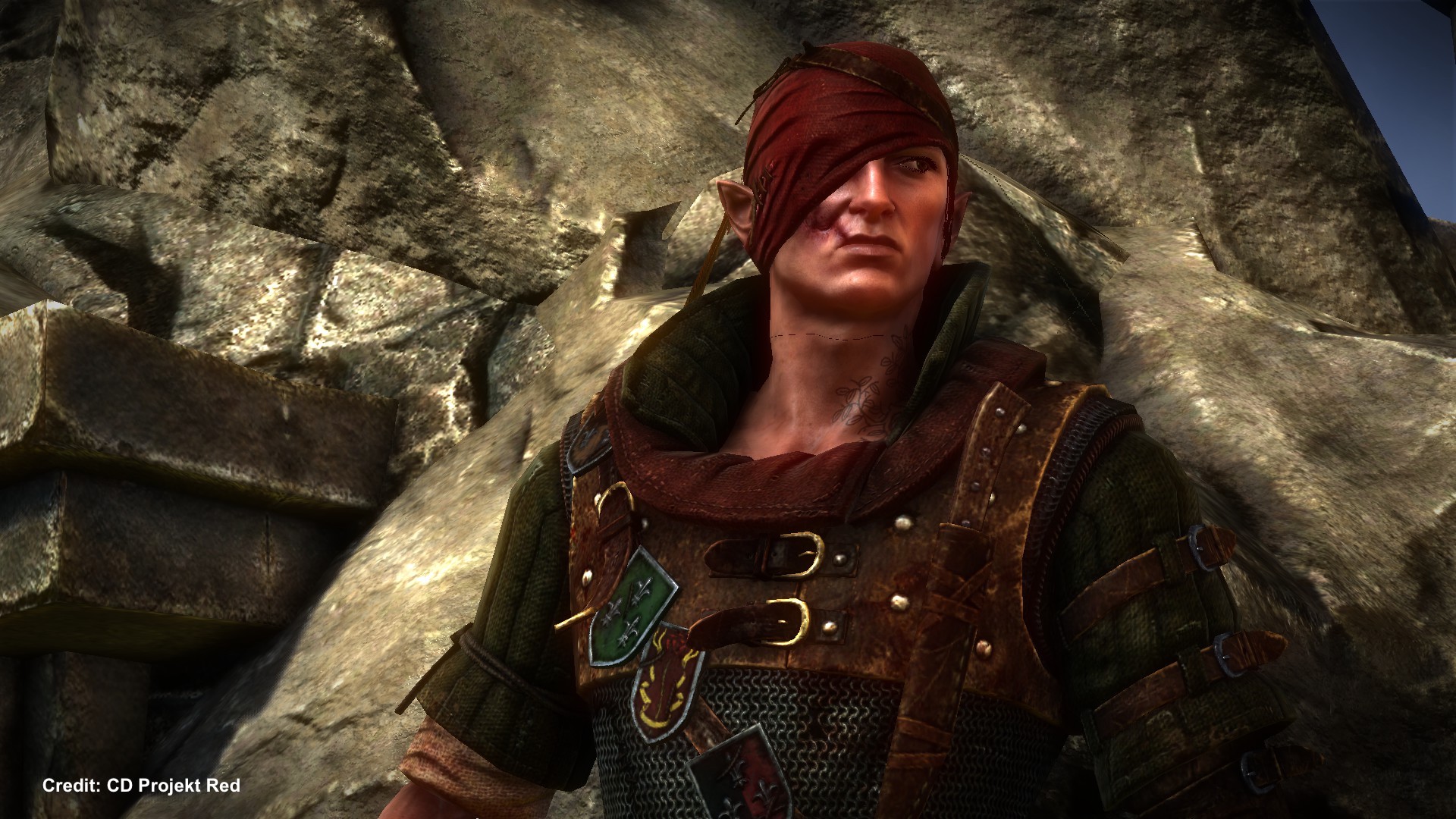
October 6, 2024
This is Part Two of a series exploring my thoughts on this topic (at this point I could – should? – probably just call it A Tale of Two Elves). You can – should, even – check out Part One here.
Long read: It won’t be a surprise to anyone who knows me well that I have plenty to say about this guy, and he’s a great example of how powerful a dash of mystery can be in creating memorable and moving NPCs. I make no apologies for the lengthy read, which was a lot of fun to write and dig deep into, but I will warn you to buckle up if you want to read on – it’s not a short ride!
“I lost the spear to a soldier, who later fought the Squirrels in the forests of the Pontar Valley. He told me he'd used it to kill some Scoia'tael big shot. I heard the shaft cracked as if there'd been some fucking jousting tournament. The most interesting thing is, that big shot is still alive! I heard he's now with that vixen from Aedirn. Some frigging commander. Elves are weird creatures. Who knows, maybe he still has that spearhead.”
“Iorveth.”
“You know him?”
Descended from a meagre handful of references to a character of the same name in Andrzej Sapkowski’s Witcher novels, The Witcher 2’s angry-elf-in-chief Iorveth is a fascinating figure.
He’s the infamous leader of a unit of Scoia'tael, nonhuman freedom fighters waging a losing war against humans’ aggressive expansionism and the obliteration of their Aen Seidhe kin. He's a warrior through and through, and so bound to conjure a set of assumptions in the mind of a first-time player. But Iorveth is painted with such vivid colour and contrast that he quickly sheds the wrappings of stock tropes. So much so that he’s landed himself the no-doubt coveted position of my favourite game character. Ever. Isn't he lucky? But – and I promise that last bit is pertinent – what’s striking is that he’s also, to a not-insignificant degree, unknowable. And not just because he’s an NPC we only encounter over a short period of time.
Iorveth is a core character in TW2, one of the two major NPCs with the power to take us on an almost entirely different pathway through the game. He’s also a remarkably memorable character within the Witcher universe (seriously, love him or hate him, TW2 fans feel things about Iorveth). And yet, while we of course never get to learn everything about a character and their backstory, in Iorveth’s case the absence of almost anything tangible about the at-least-century-long past that formed him is conspicuous.
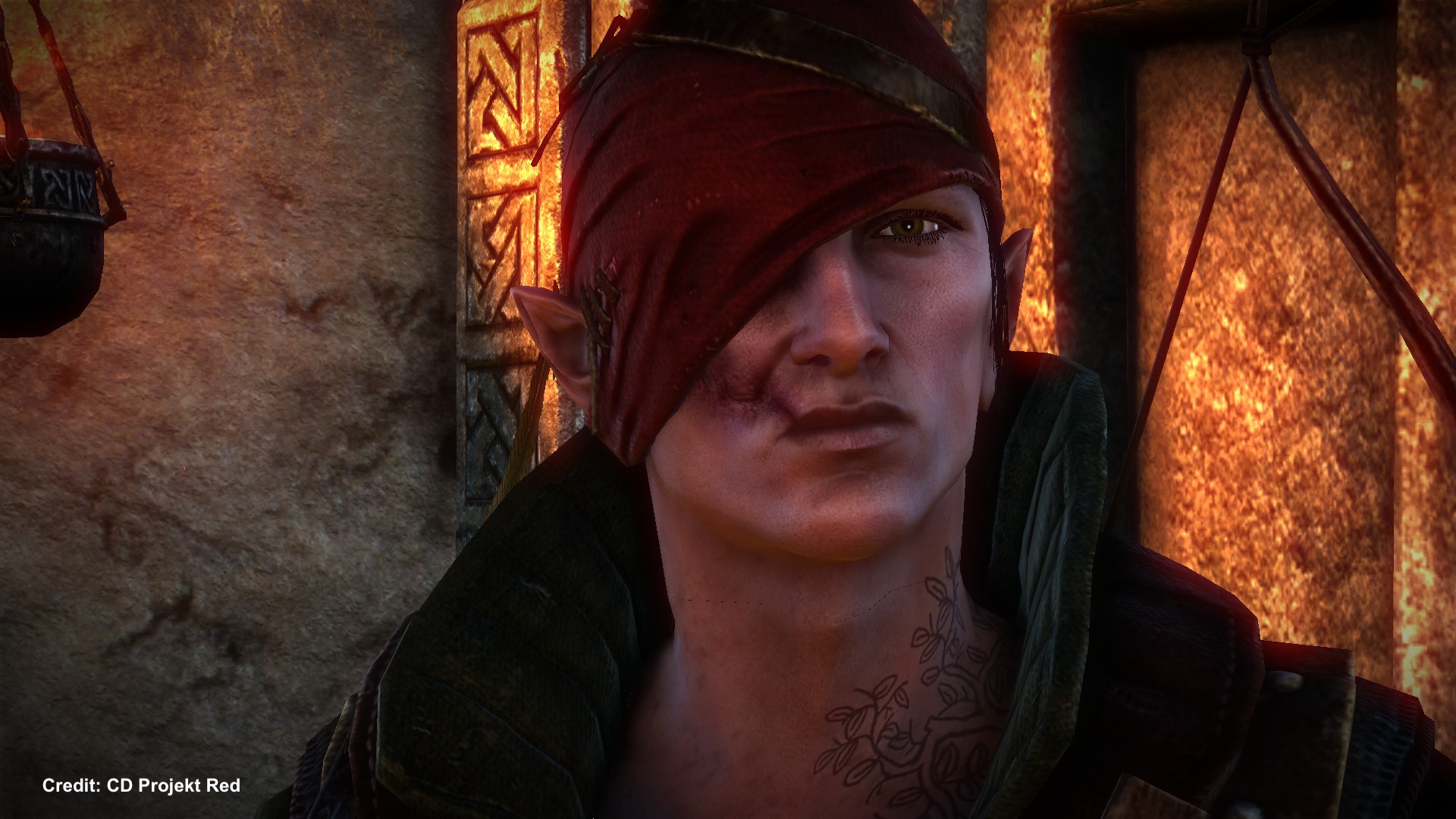
In several crucial ways, CD Projekt Red seems to deliberately leave so much of him just out of reach, and the effect that this has on player agency is profound. By veiling so much of Iorveth in mystery, while still weaving his character and story with threads that positively beg us to tug at them, the studio executes a powerful hook. We find ourselves hungrily seeking answers to questions that various facets of his character continually raise. Then, when the game withholds some of the juiciest morsels, we begin to fill in the gaps ourselves. Before we know it, he's carved a far deeper place in our experience of the story than we might ever have expected given what we know – and don’t know – about him.
Let me explain.
Part One: There’s Something in a Look
Iorveth’s character design is where this tantalising sense of mystery first gets to work. We initially encounter him in a cutscene right before Act I kicks off, in which he acts alone. We see a forest warrior going about his dangerous business. We’re shown that he’s clever, alert, capable, and – frankly – really bloody cool. There’s little to infer about Iorveth as distinctive from the game’s other characters here as there’s only its chief antagonist Letho – a massive, bald beefcake of an ex-witcher – for contrast, but in the next scene we find ourselves in the swampy, present-day boots of the player-character, Geralt, and in a position to really confront this mystery elf.
Iorveth cuts a striking figure, not only against the lush, verdant greens of the forests outside Flotsam, Act I’s setting, but against the other Scoia’tael we soon see surrounding him. While his unit all appear as we expect, kitted out in distinctively elven gear, Iorveth is different. He’s clad in a strange mixture of elven and dh’oine (human) clothing, and sports a string of military badges slung across his chest. He’s introduced, physically, in a way that prompts questions: Why does he dress like that? What are those badges, and what do they mean to him? We later get a few bare-bones answers – for example, those badges are trophies taken from nonhuman-hunting special forces units he’s cut down, though any further detail is left to our imagination.
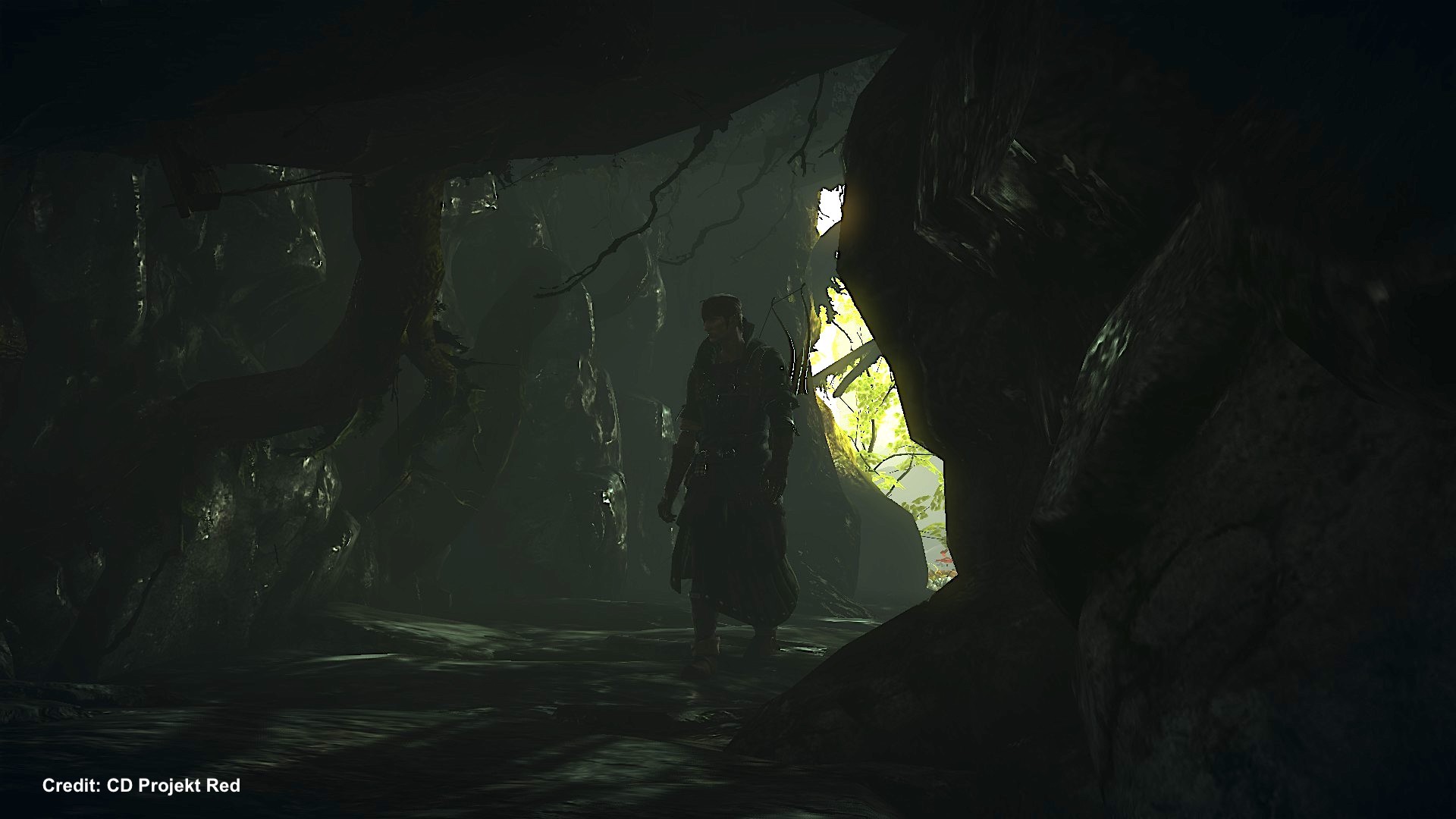
Most distinctive, though, is that Iorveth’s formerly flowing elven hair has been chopped short and stuffed under a red cowl that covers the remains of a major injury – one which took his eye and a mighty chomp out of his cheek. Its scar runs all the way from his lip to his now-empty socket. His character design is markedly and deliberately very different to all of his fellow Scoia’tael.
In the clearest of ways, his physicality – partly manifested in this sign of major physical trauma – immediately invites us to ask big questions about him in a way the game’s other characters don’t. What happened to him? What effects have experiences like that had on him? And what might such an injury mean for a guerrilla fighter and expert archer who lives a wild, unpredictable life, and must rely on his own faculties for survival more than most others in this game's world? This guy is Iorveth – his infamy precedes him in the game, so he’s got to have some fascinating stories about his past scrimmages and scrapes ready for us to lap up, right? So, what is that story? We want to know because his character design makes us want to know.
At the same time we learn that Iorveth’s unwilling to readily display this injury. His cowl is stitched into a shape that hangs low over his cheek, hiding most of his scar, and he ensures that it stays in place by strapping it on tight with a leather band. This cowl is such a distinctive part of his physicality that it’s even reflected across the otherwise-crude ‘wanted’ poster depictions of him smattered across Flotsam.
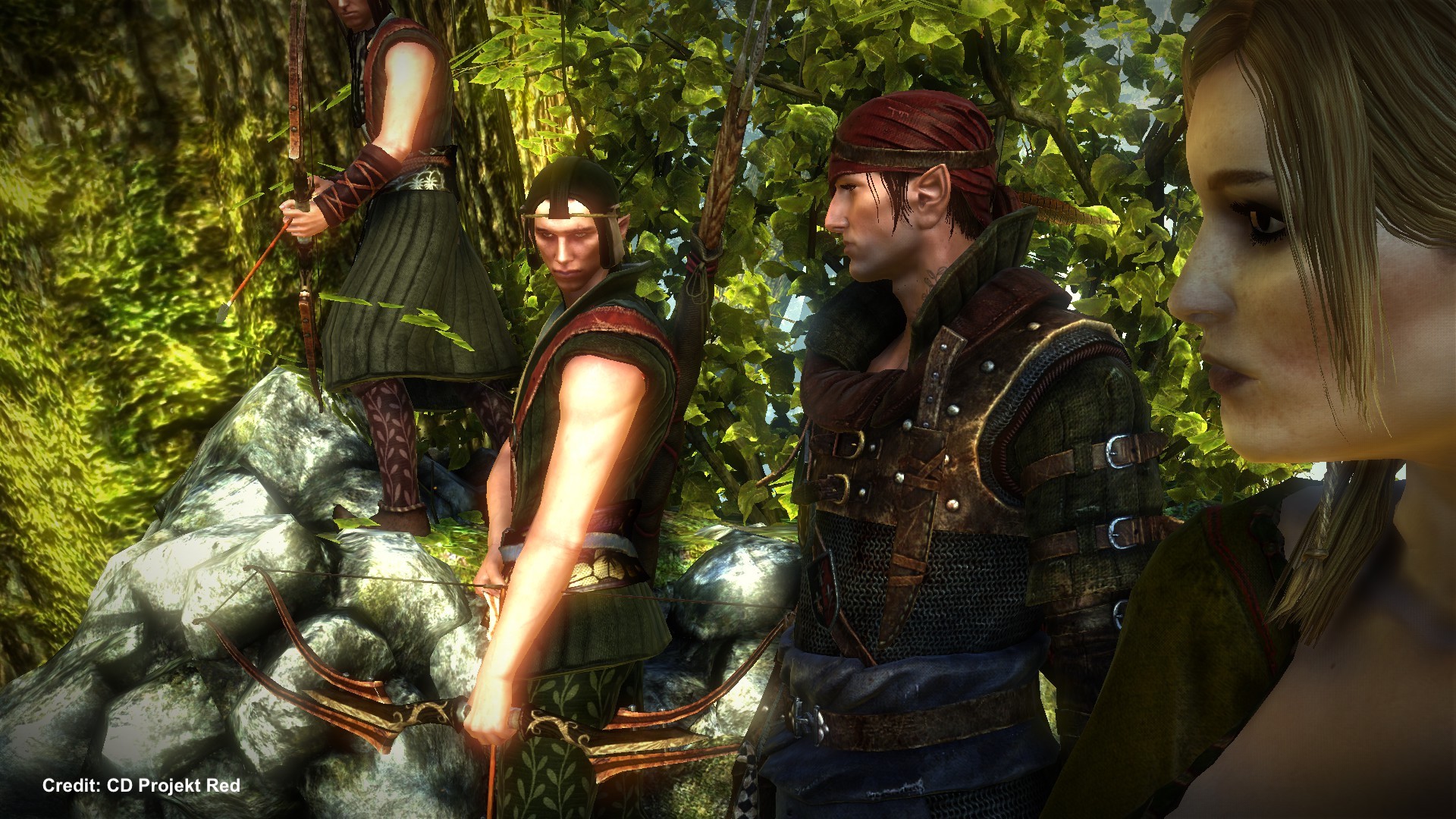
So now we’re prompted to ask yet more questions. What happened – and why hide it?
The official Witcher 2 artbook indicates that the “Aen Seidhe’s pride makes him conceal his scars” and the injury he sustained is “the price he paid for his determination”. Sure, this makes total sense, and perhaps we could guess as much – but he never tells us any of this. The majority of players who didn’t manage to get their grubby little mitts on the artbook will probably never know these things (unless they’re reading this blog post right here. In which case, hello, greetings. I’m chuffed you’ve got this far through my ramblings). These visual signifiers of Iorveth’s character and history prompt us to actively wonder what the scars mean to him, and what his decision to hide them might tell us about him and the game’s wider world. But they root us in the present, while leaving the past – the how, where, and who of it – shrouded in mystery.
Later, if the player’s choices lead to Iorveth fully trusting our version of Geralt, he’ll decide to wear his cowl flipped up in and around the Scoia’tael dwellings in Vergen, revealing the true extent of his past injury. The detail that’s gone into his character design is impressive and, again, deliberate; we are left in no doubt that he sustained a truly traumatic injury at some point, and that his feelings about the mark it’s left on him are clearly bound up with how he feels about those around him in some way. Our Geralt has done something – enough of something, at least – to clear a bar in Iorveth’s mind.
This visual prompt intensifies the sense of investment and interest we might have in this character. Having Iorveth feel comfortable enough around our player-character that he’ll allow his trust to overcome the 'pride of the Aen Seidhe' is a very visible design decision that powerfully enhances the subtle storytelling at work. But it also goes beyond this – it dials up the urge we feel to get our hands on some answers. Now that he trusts us, we might think, he might be willing to share this story, this part of himself, with us. But no – crucially, the subject is still off-limits. Despite the prompt, we can never ask Iorveth about this part of his past, and he never tells us. CDPR shows us this stunning, distinctive character design, uses it in subtle ways to invest us in the character himself and tease hints about his past, which makes us want to know more, but then withholds the answers that we want.
Mostly.
Because that’s not to say we never get any idea at all. We get something, but I’d argue that the way it’s packaged only intensifies the sense of mystery surrounding our favourite elven grump.
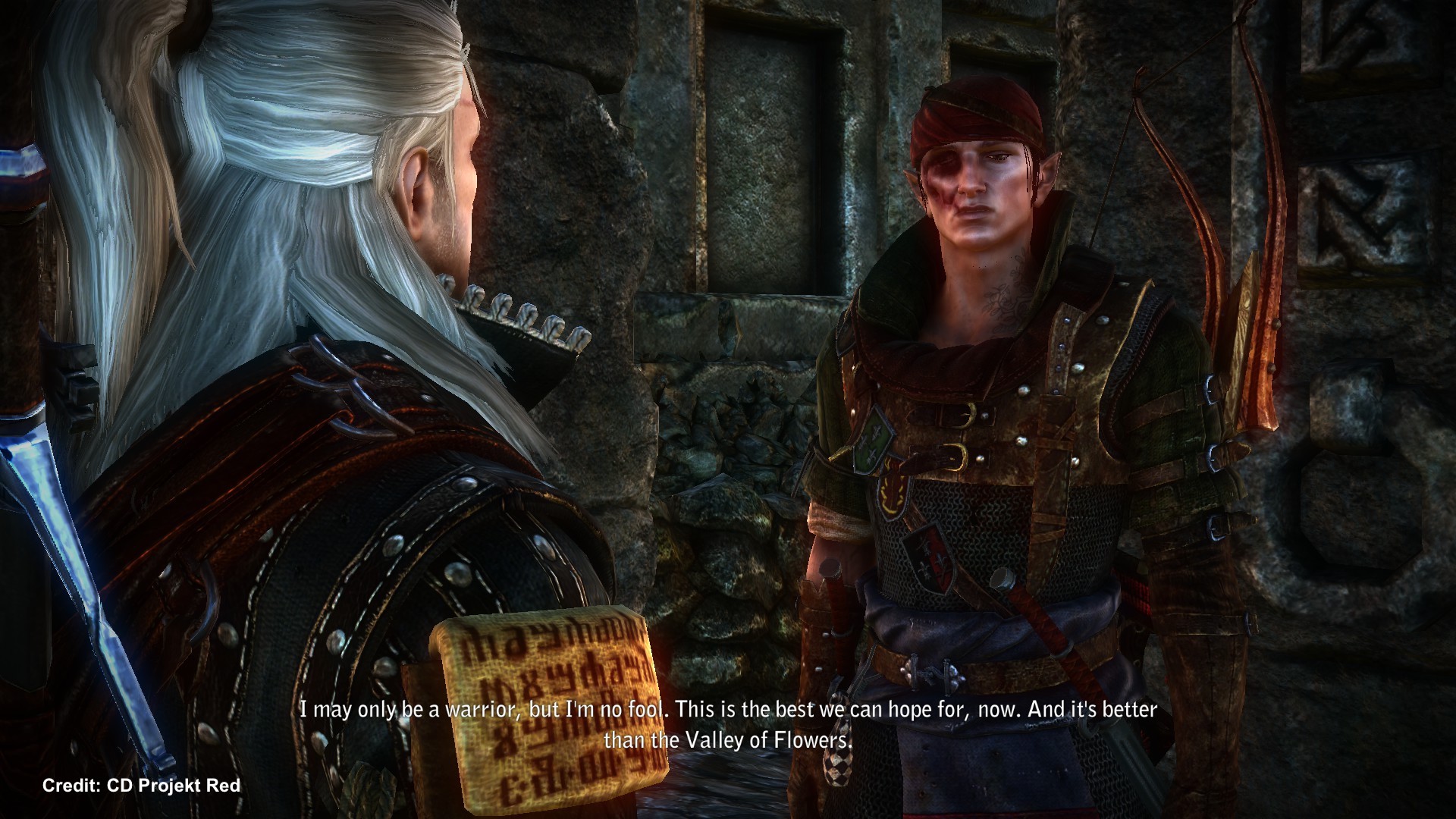
The chunk of dialogue at the top of this blog post is hearsay shared by a dubious relic seller peddling overpriced knick-knacks and tat – a salesman turning a profit in an army camp by preying on soldiers’ fear and superstition.
Hell, it sure sounds like that “Scoia'tael big shot” he mentions is Iorveth. Geralt, our avatar, seems to think so. And the tale is certainly plausible – but it’s also second-hand gossip spouted from the mouths of characters who have obvious motives for exaggerating their own bravery, or the value of the trinkets they’re looking to shift. Of course a foot-soldier didn’t just take down a fellow faceless fighter; it was the Scoia’tael unit’s infamous leader himself! Of course the peddler's relic wasn’t just some random weapon; it was used to do that famous deed itself (and other illustrious stabbings besides)! Of course a spearhead Iorveth lost in a game of dice poker must have been the thing that gave him a feature distinctive enough that it's made it onto posters etched by those who don't know him. An elf with over a century's experience of conflict couldn't possibly have acquired an item that had some other meaning or relevance!
We’re dealing with deeply unreliable narrators. It’s all intangible and uncertain. It’s the most likely explanation for his injury, and, honestly, it’s probably true. But it’s also far from a definitive answer. CDPR still leaves plenty of room for mystery and obscurity. We still can’t pin this guy down.
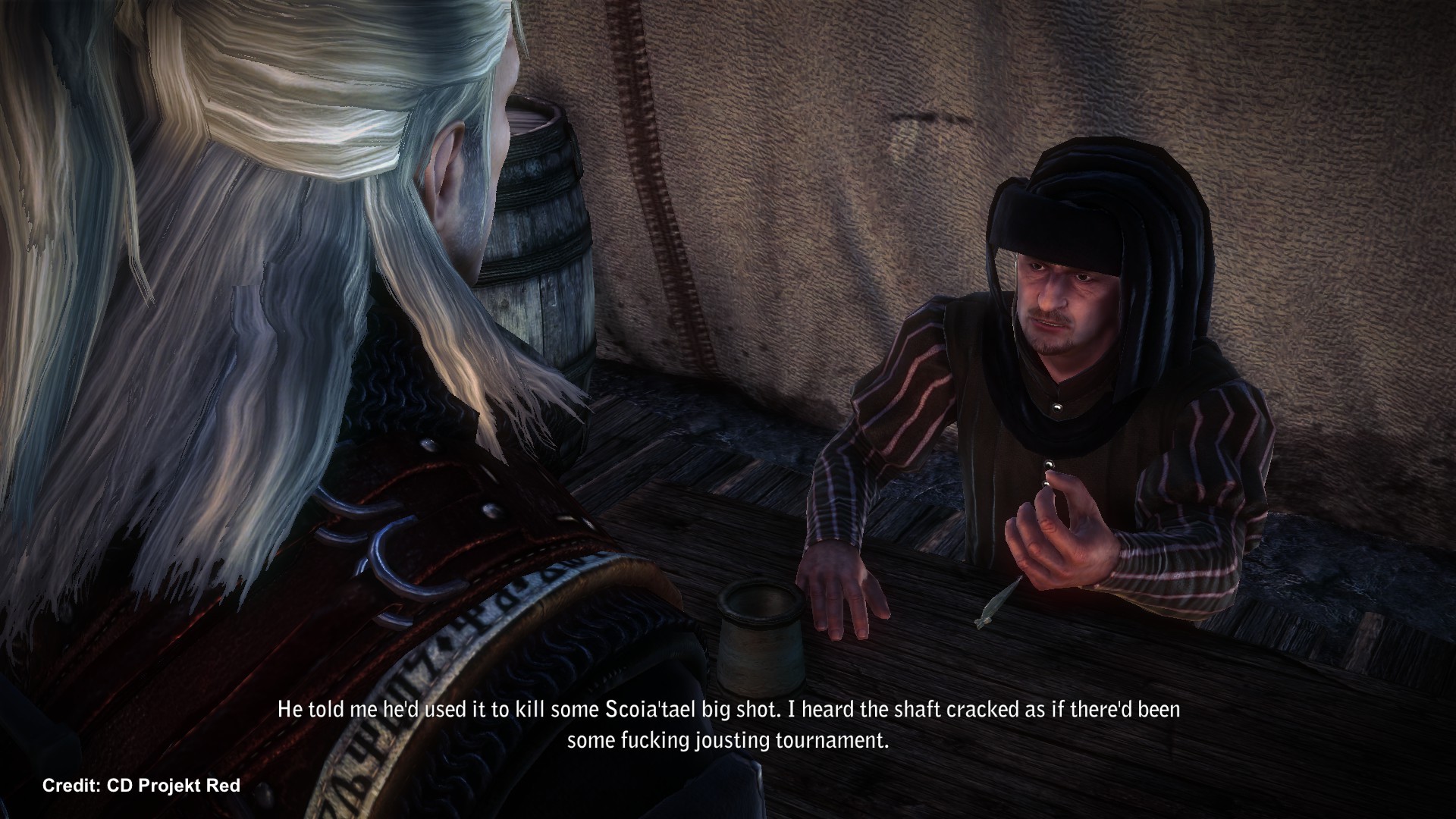
And, there’s a big twist: we only get to hear this snippet if we choose not to side with Iorveth in the game, and branch off into his rival Vernon Roche’s storyline instead. It’s really clever storytelling that enhances the unknowability of this mysterious ‘other’ – the one you didn’t choose – who now lurks on the other side of a cursed mist, out of sight but not out of mind. Only players who do a full replay of the game will get even this much of the picture of one of its central characters.
We’re left hungry; wanting more.
And Iorveth’s character design is just one way in which mystery is dangled in front of us like a carrot on a string.
Part Two: What He Says (And Doesn’t)
“I am who I need to be.”
This line – heard only if your not-so-silver-tongued Geralt pushes Iorveth too far during a chinwag with lethal consequences – captures the essence of Iorveth’s character as we experience him beautifully. And it also illustrates how intrinsic mystery is to what he says and reveals about himself throughout the game. Because what he allows us to experience of him is what he feels we need to experience - no more, no less.
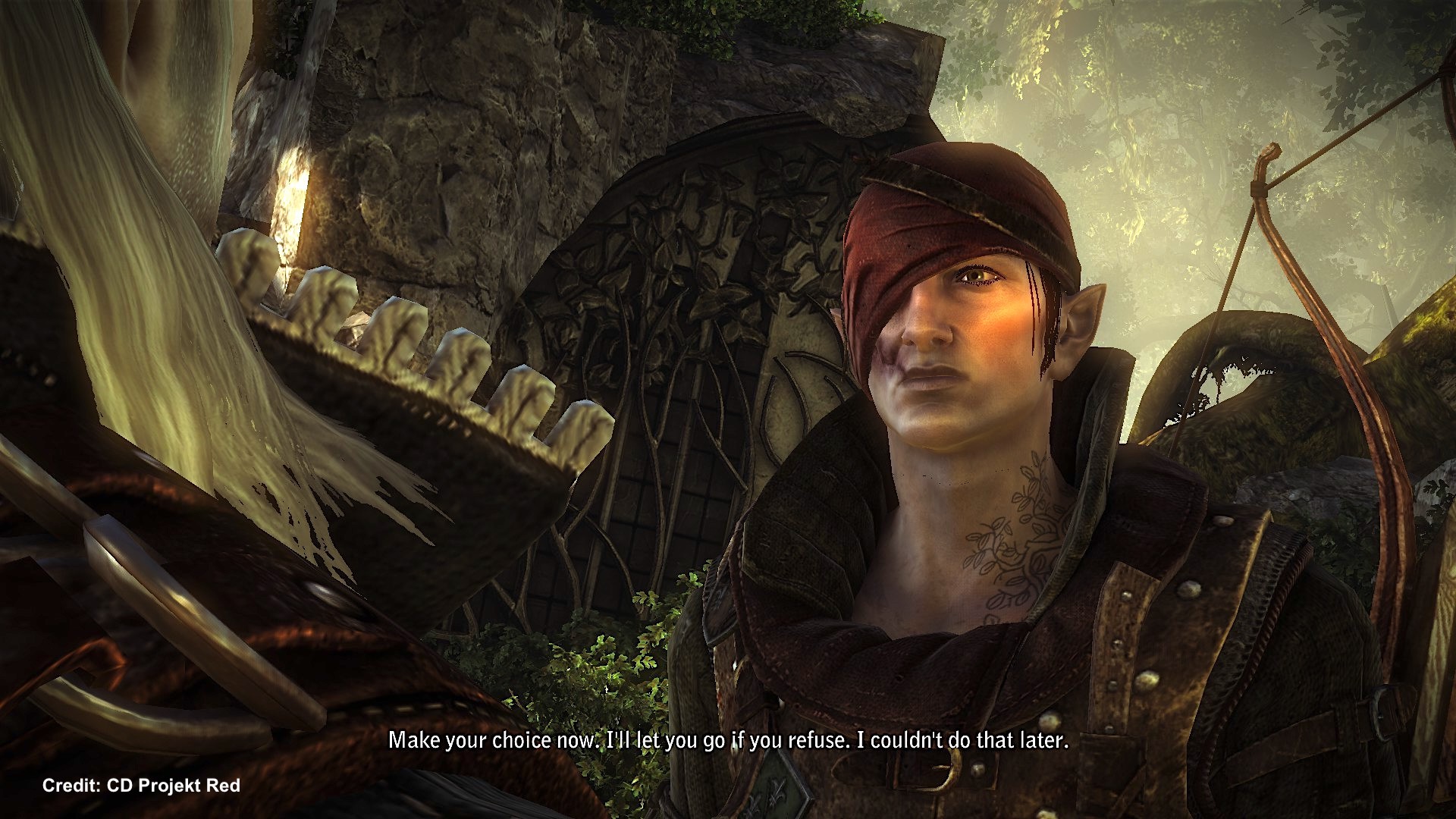
A strikingly consistent seam that runs throughout Iorveth’s dialogue is just how restrained he is; how considered and deliberate he is in deciding what he’s prepared to share with us, a pattern that never fully goes away, even if he comes to consider our version of Geralt a true ally. This restraint is made very clear, which leaves us with the sense that there’s something – some deeper part of him he’s chosen not to share – always just out of reach.
First, there are the obvious ways – and there are lots of them.
Iorveth makes Geralt jump through a lot of hoops before he’ll share even the smallest nuggets of information, characterised by a lot of obtuse sparring (“You wouldn't understand”, “We live by our own rules, doing what's necessary to attain our goal”, “What's it to you, Geralt? Esseath vatt'ghern... You'd tell me to stuff it up my arse”). If asked something that cuts a little deeper than the usual shop talk, Iorveth pauses to think before saying something like, “I suppose I owe it to you, Geralt.” In trickier strategic moments, we see him pace for a few moments before answering as he physically acts out weighing his options in front of us. He sometimes slips into Elder Speech to answer overly direct questions in an evasively philosophical way (“Ayd f'haeil moen hirjeth taenverde” – “Conquer with courage rather than strength”). If Geralt snaps at him with a cheap shot (“Of course… I forgot what kind of warriors you are”), Iorveth won’t rise to the bait; he just smiles and wishes Geralt luck.
If Geralt tries to push the boundaries, Iorveth fires a shot across his bows as a warning not to push any further, whether that’s by getting too personal (Geralt: “Is she your fiancée?” / Iorveth: “Don't mock me, Gwynbleidd.”) or trying to stretch their alliance too far too soon (Geralt: “I need to know more before I decide.” / Iorveth: “No, vatt'ghern. You helped me with Letho. That's the sole reason we're speaking. We may both be pursuing the same son of a bitch, but I haven't forgotten the company you arrived in. Make your choice now. I'll let you go if you refuse. I couldn't do that later.”). He's also visibly rattled when Geralt reveals he's aware of a whopping great secret about Saskia's true nature, visibly starting before asking "How do you know?" in a low voice and then launching into a scorching threat to Geralt not to spread the secret further.
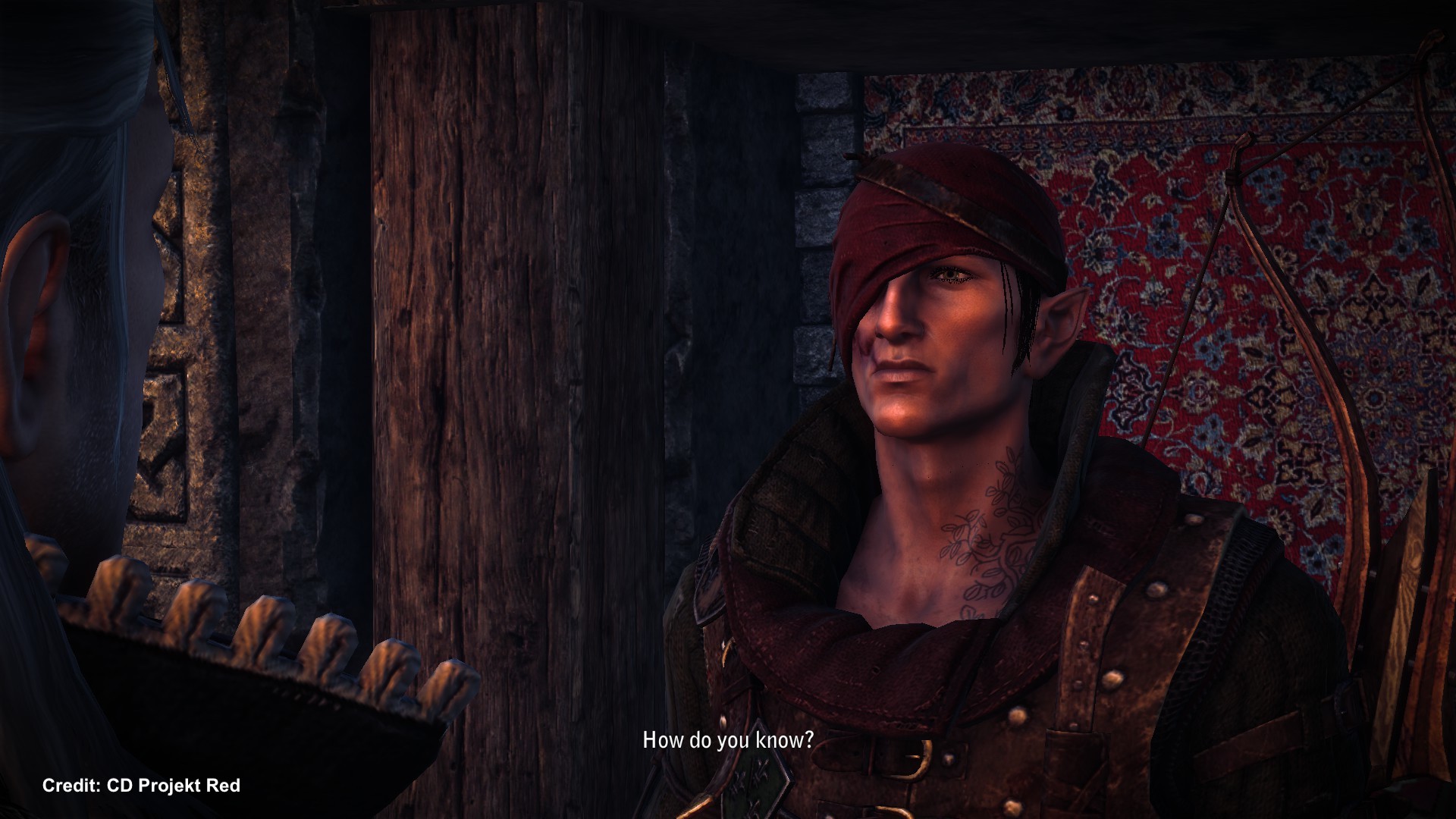
All of this combines to create a feeling that Iorveth – the “true fox” as he’s called – is, or could be, holding something back, only allowing choice morsels to pass through the net. And there are subtler ways in which his speech patterns betray a sense of mystery, too.
The more time you spend with Iorveth, the more it becomes clear just how fixed on the present he is. On what needs to be done, now, and why. He tends only to reference the past as justification for his goals, and in broad strokes. And his focus on his aims and ambitions, to the omission of almost everything else, extends well beyond the dialogue sequences directly related to quests (in which he naturally needs to impart this kind of objective-driven info).
For example, Iorveth spends a good portion of Act II hanging around the dwarven town of Vergen with little to do in the way of plot, but there’s plenty you can talk to him about – he has a dialogue tree brimming with topics to sink his little cuspid-free teeth into. But you quickly realise that anything you can come to learn about him on a deeper level is hard-won, and mostly stuff that you’ll have to infer.
He tells us that the elven queen Francesca Findabair is the reason he doesn’t trust sorceresses, because she “sent the Scoia’tael to be butchered” after the Battle of Brenna. He says that he needs to kill Vernon Roche – the game’s other major ally – because the “safety of the Scoia’tael demands his death”. He offers some insight into how other nonhuman-killing units like the Blue Stripes operate, and why. He tells us that he needs to create a free Pontar Valley because the only elven kingdom, Dol Blathanna, is “nothing more than a vassal state of the Nilfgaardian emperor”, where his Scoia’tael kin are not welcome.
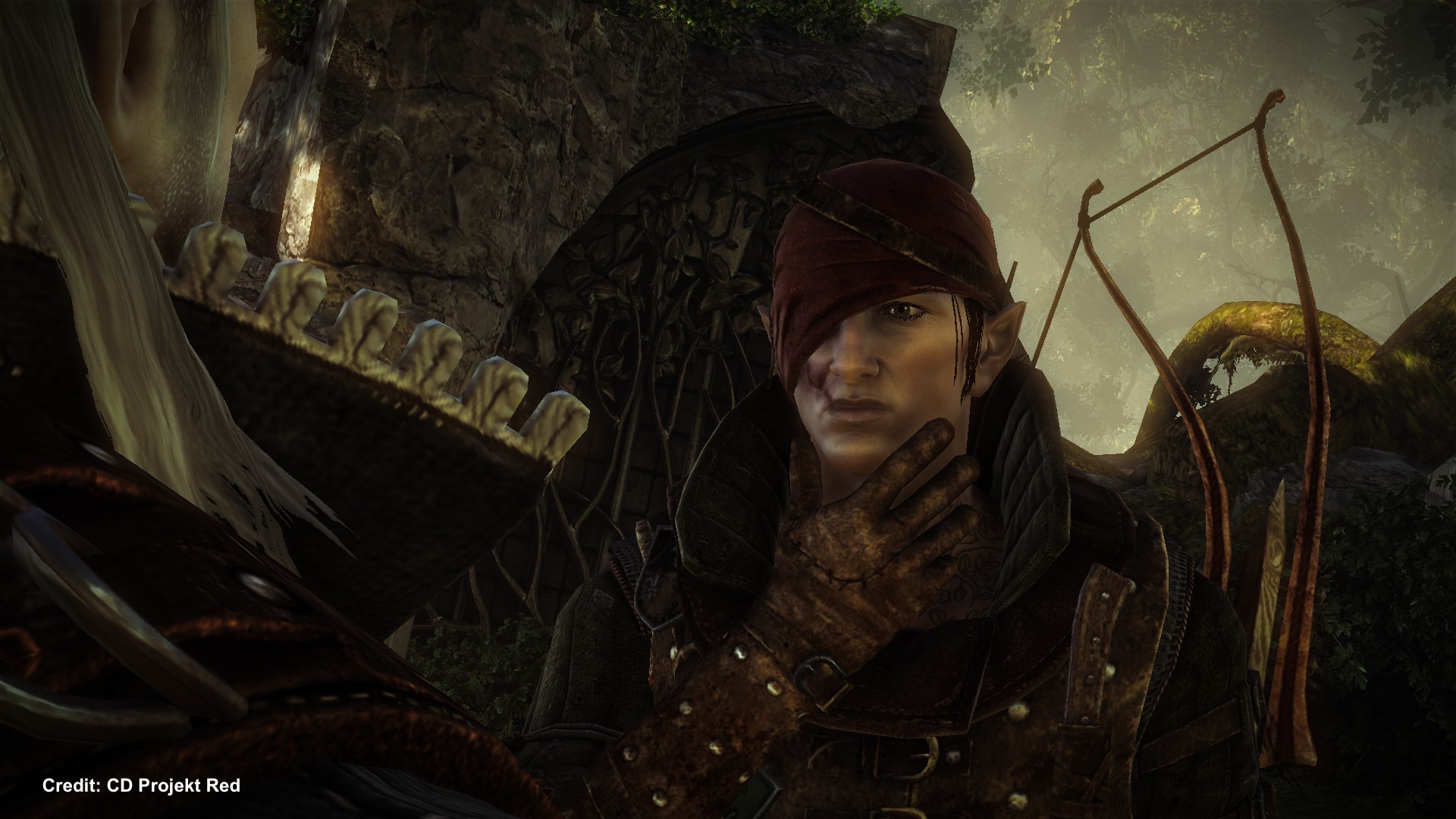
It’s a lot of worldbuilding, peppered with some of his more surface-level thoughts and nods to his past experiences. Ones you get the impression he'd be happy to share with more or less anyone he's not currently looking to drop with an arrow. It’s rich in what it tells us about the game’s world, but spartan in what it tells us – really tells us – about him. It feels like he’s keeping us at arm’s length, which only increases the urge to push harder; delve deeper. I want to know more, dammit!
And then he’ll start to tease us with something deeper.
Ask about the “dh'oine for whom the Scoia'tael are ready to do battle” and we find we’ve touched a nerve. “Saskia?” he replies. “She's no dh'oine. Certainly not like the others. You've seen her. I doubt I need to explain.” Iorveth’s (excellent) English-language voice actor Mark Frost delivers this line with exactly the hook it needs to draw us in. He imbues it with just a tinge of softness that we’ve not witnessed before, and it makes us want to beg him to definitely, 100% please explain because we're hungry to know more and want to swipe at that carrot on a string. 'What is this other side to Iorveth?' we ask ourselves. How does he really feel? What does this pointed little hint suggest is the real – or at least ulterior – reason for his role in fighting for a free Pontar Valley? Does he love what Saskia represents, or does he perhaps love her? What’s this deeper, personal slice of him that we’re seeing teased?
But then he pulls back.
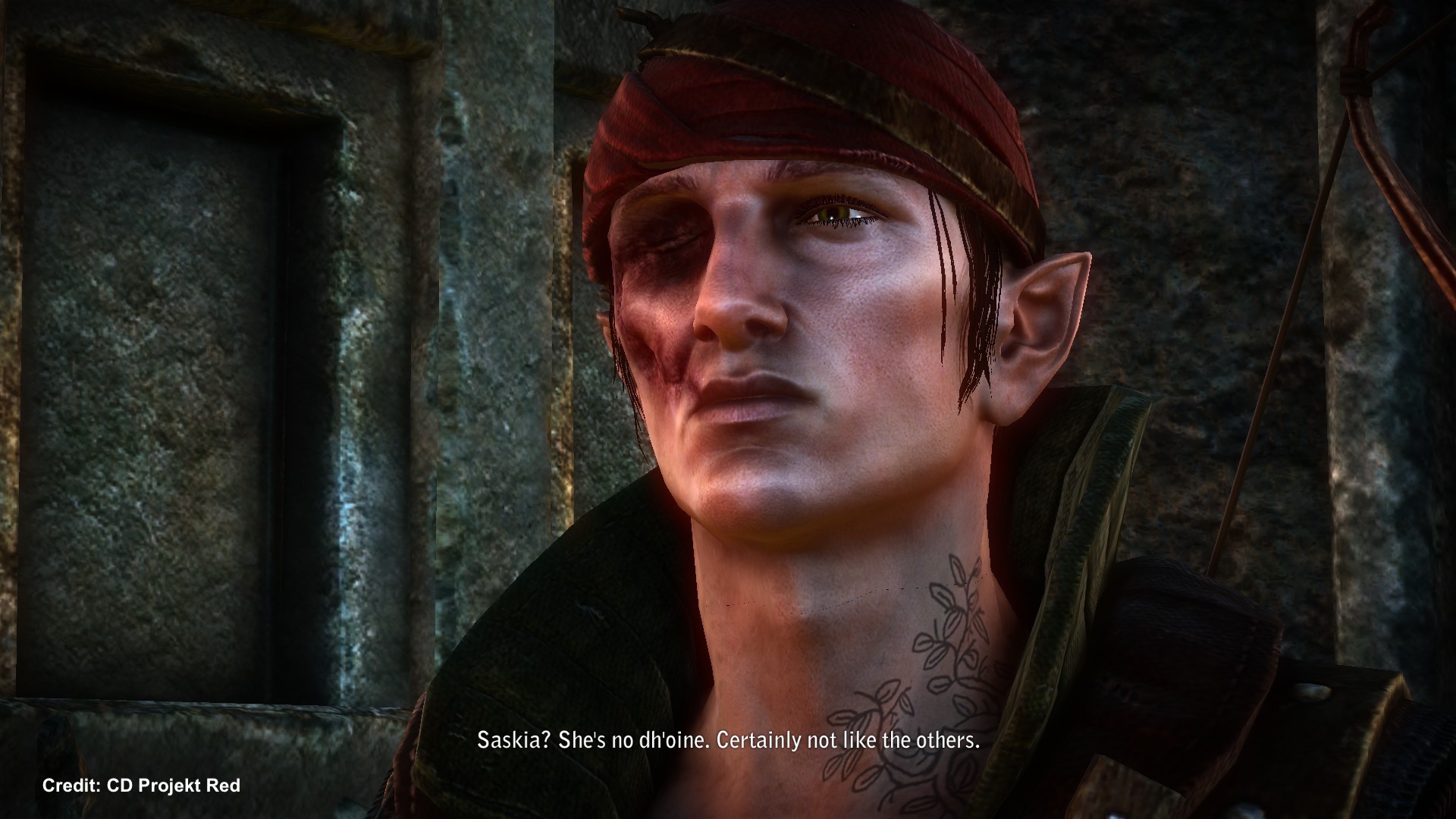
Geralt pushes for a clearer explanation; he thought Iorveth hated humans. The “sly old elf” then retreats from the brink of the personal back into talking shop: “I may only be a warrior, but I'm no fool. This is the best we can hope for, now. And it's better than the Valley of Flowers.” Sigh. So close, eh?
And this is far from the only tease that he gives us about who he really is, beneath his ‘being who he needs to be’ for his cause. For example, we come to learn that he’s got a cheeky, slightly comical streak. He plays along when Geralt calls him “mad”, joking, “my mother claimed likewise". He calls a tricky bit of deception a “piece of lembas”, comically replying “Nothing, dh’oine” to Geralt’s confused “What?”
At one point we also get a different, but no less tantalising, kind of tease: a peek behind the curtain into Iorveth’s actual dreams, which feels particularly moving because it has the power to transgress the sense of mystery that usually surrounds him. The dream itself, bound to a harpy’s magic crystal, is poignant. It reveals a deep sense of longing in the elf for something so simple: he doesn’t dream of grandeur or glory, but only of a warm, crackling hearth, somewhere cosy to sit, and a table groaning with more food than he’s probably eaten all year. It doesn’t strictly contrast with what he’s told us he’s fighting for – a free future for his persecuted kin – but it is at odds with what we’ve seen and heard of him, a notoriously violent warrior who in Act I will have Geralt and his dwarven friend Zoltan shot dead in a heartbeat if the witcher merely says the wrong thing.
In dialogue with Iorveth, we can sometimes almost feel ourselves hit a wall. But his restraint doesn’t stem from coldness. We know this because one of the surprising dimensions of Iorveth’s character is his willingness to embrace Geralt as a firm ally over such a short period of time.
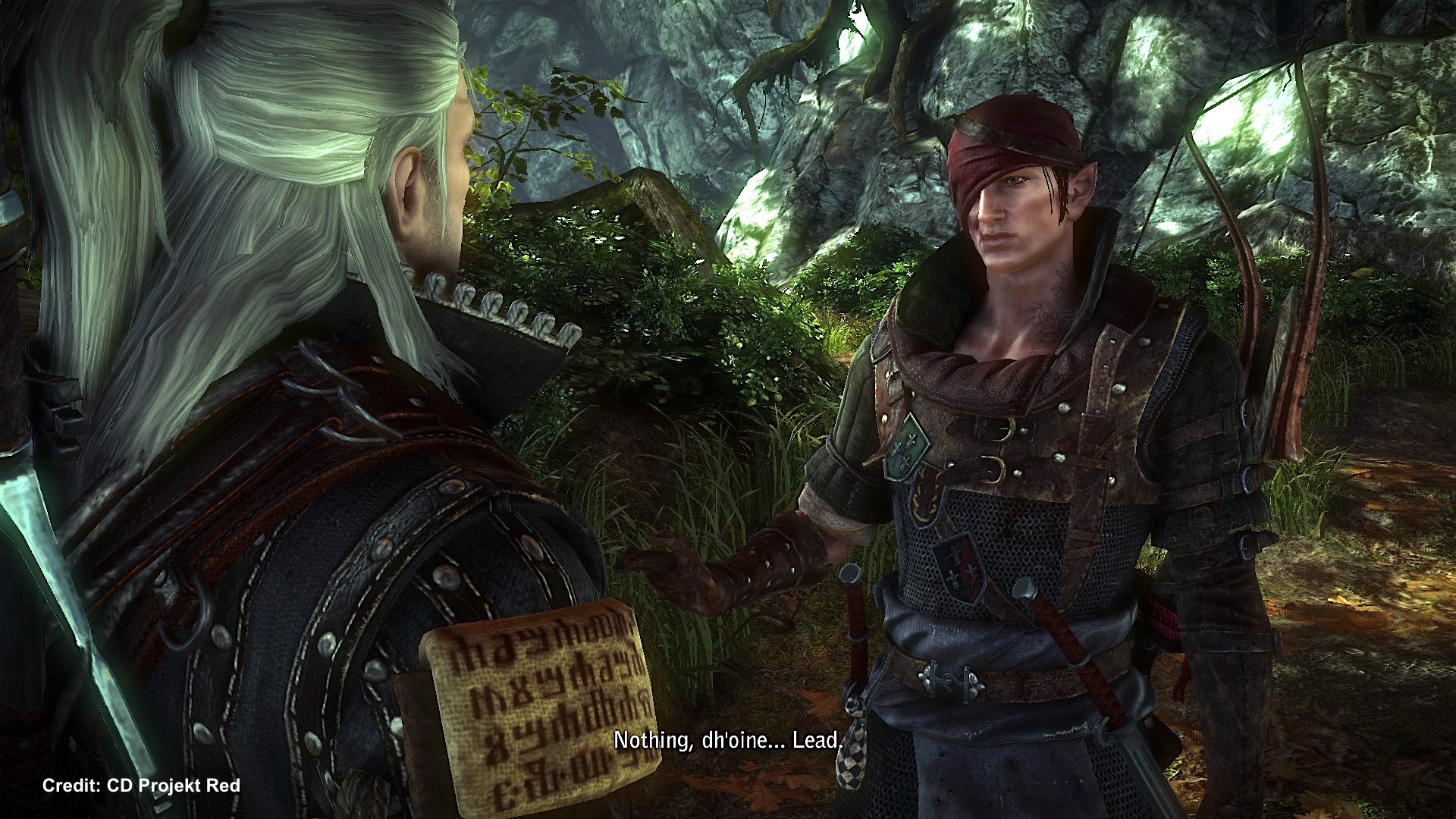
If we continue to side with Iorveth when it matters, the elf essentially calls Geralt a friend in Act III (“You're the most noble human I know, Gwynbleidd,” he says, in a soft tone). He physically helps pull Geralt to safety from a cliff, before clapping him warmly on the arm and smiling – a rare enough thing that is explicitly mentioned as such earlier in the game. When the deceitful sorceress Philippa Eilhart turns on them both, he’ll shout to Geralt to warn him of the danger, and even apologise that he’s trapped and can’t get to the witcher to help. In the split-second he realises Philippa’s about to attack him he doesn’t call for help, but cries out to warn Geralt instead. It’s made clear that Iorveth comes to regard Geralt as a true friend, which makes it equally clear that the restraint we encounter in him doesn't signify that he’s just an obtuse, blunt, or mistrustful figure - it’s that, in Iorveth, still waters run deep. We end the game feeling like there’s perhaps much more there, just out of reach.
If only we had the time.
Part Three: Dimensions and Contradictions
Part of the tantalising unknowability of NPCs in branching-choice RPGs – especially the really mysterious ones – is the fact that we’re never really encountering that character as a whole. What I think we really experience are facets, or dimensions, of a character – the shades not necessarily of who they are in any kind of a universal sense, but of who they can or will be when confronted with different scenarios. With the different outcomes we create for them and the different ways we present ourselves to them.
Scary as it may be to think about, I think this taps into a truth about all of us – that we could in theory be or become someone very different to who we think we are if the chess pieces of our lives are moved into different enough places. And Iorveth is a fascinating example of this, because he – in some crucial ways – refuses to be bound by tropes and our expectations. And this only enhances the sense of unknowability and mystery of him.
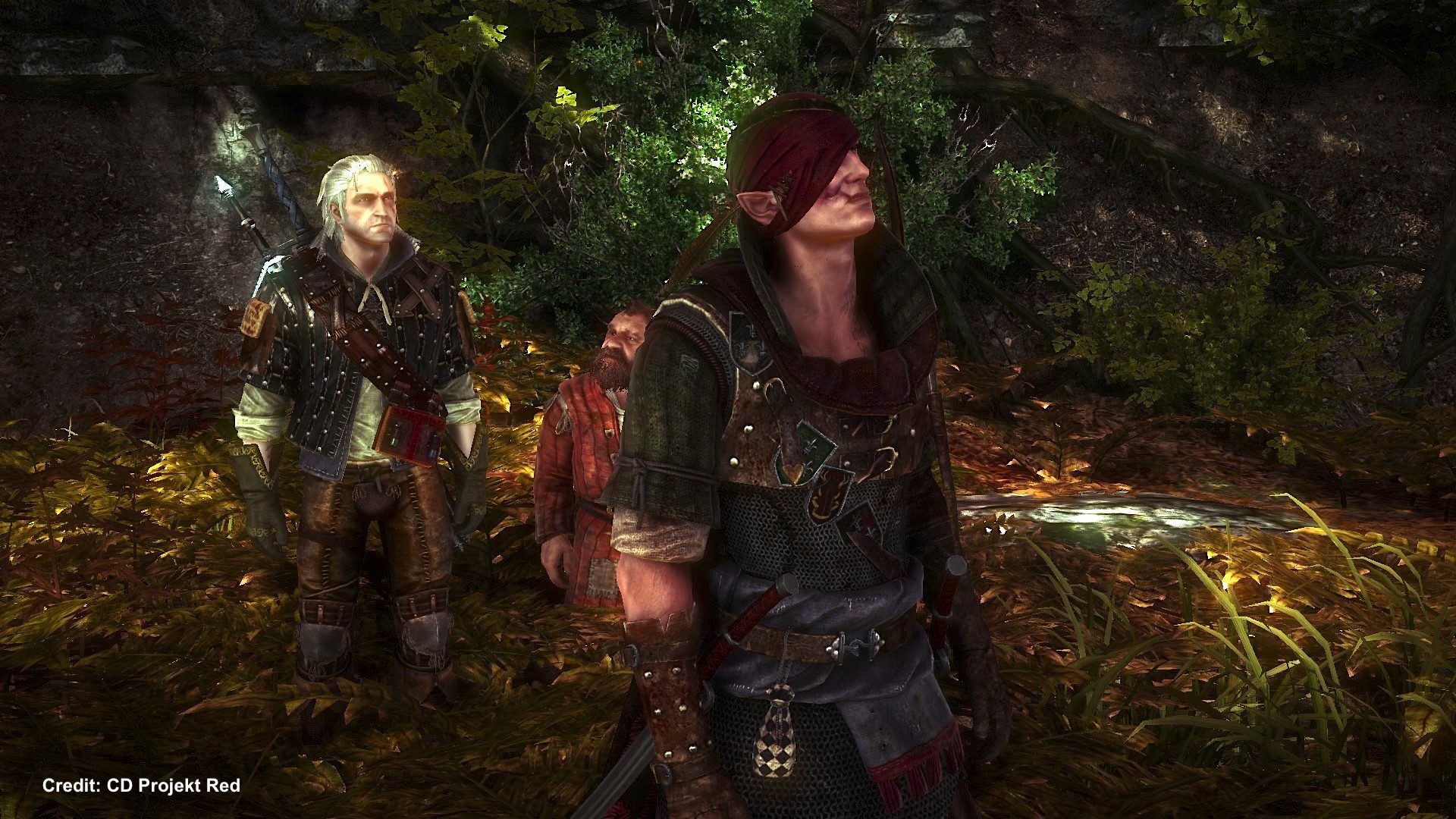
The most important deviation from our expectations is one that'll surprise players who’ve paid literally any degree of attention at all to Iorveth's words and perspectives in the early stages of the game – especially if they battled through The Witcher 1 beforehand. Unlike the majority of the Scoia’tael we encounter across the games, Iorveth comes to reveal to us that he is not pursuing a future dominated by elves. He is not trying to create another elven state. He does not believe the Aen Seidhe can be restored to their former glory given the state of the world.
Perhaps he did once. Though most of his past is unknown to us, we can easily imagine that a younger incarnation took to the trees and the sword with that shared ideal. He certainly fought hard and violently for nonhumans’ future at the Battle of Brenna, choosing to ally with the dastardly Nilfgaardians to beat back the Northern Realms, who ultimately won. And he’s continued to fight violently for many years; optional dialogue with Cedric, a former Scoia’tael, confirms that he’s “famous for his viciousness”.
Now, though, Iorveth is pursuing a very different goal. “We want a truly free state where an elf could visit a human inn! A land where humans could enter the forest without fear!” he explains. His vision for a stable future for nonhumans includes the very humans that he hates, and has spent over a century killing. Along with a rag-tag collection of Aedernian forces, nonhuman fighters, and others led by Saskia ‘the dragonslayer’, Iorveth wants to seize the Pontar Valley and help build a free realm in which the various species can live side-by-side in peace.
It’s a staggering revelation given all that we do know about him, and the effect is profound. Fundamental contradictions like this cloud Iorveth’s character in our eyes as much as they clarify it. When he says, “I am who I need to be”, he is not kidding.
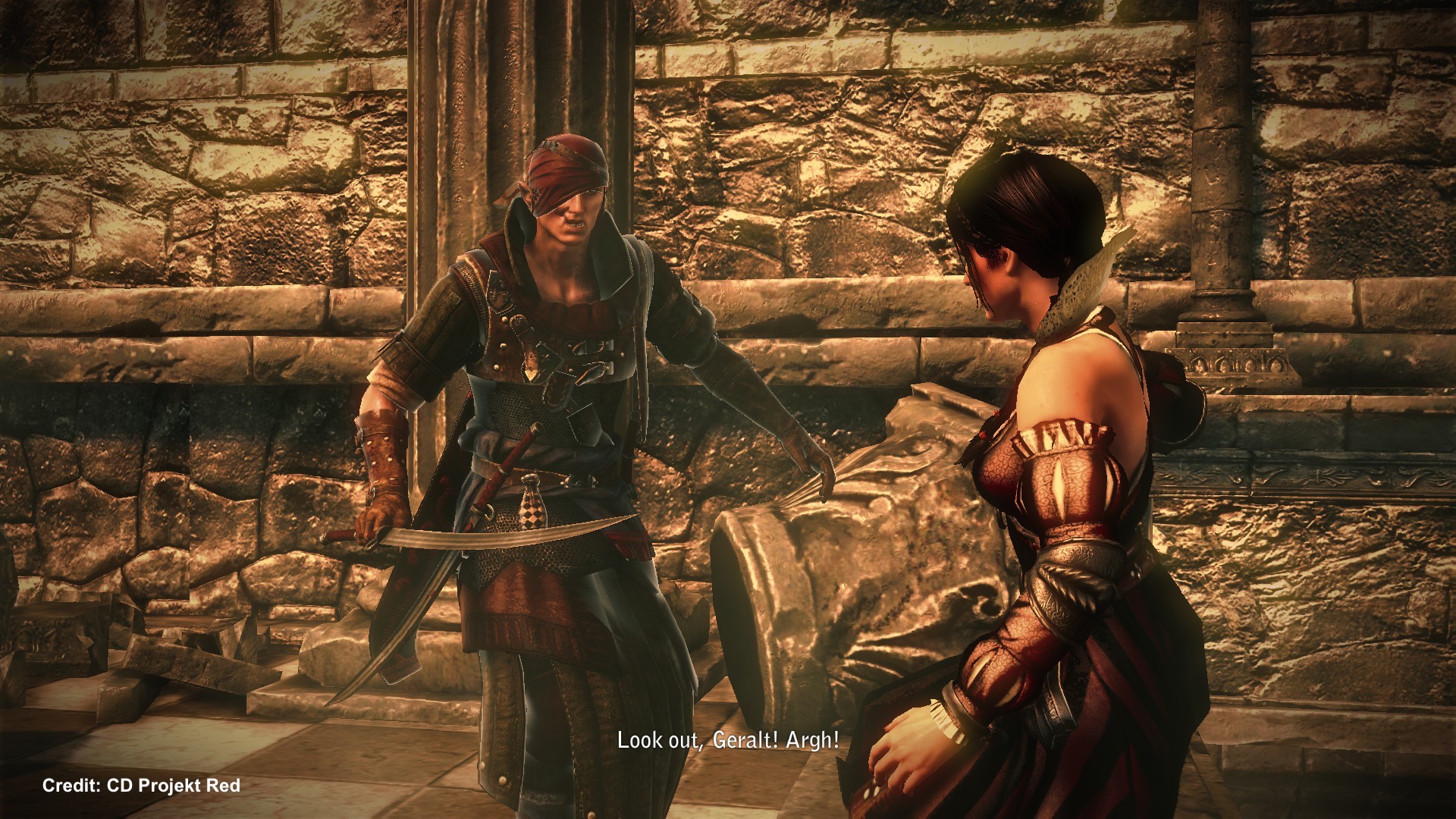
Throughout the game, Iorveth speaks openly about his hatred for dh’oine. He explicitly mentions his “hatred for the species”; he tells us which kinds of humans he enjoys killing best (guards, it seems), telling us it’s “like pulling weeds – strangely relaxing”. One of his most famous lines, which made it onto his Witcher 3 Gwent card, is “King or beggar – what's the difference? One dh'oine less.” And, crucially, he clearly attributes a significant degree of what he hates about them to something inherent to them as a species.
Take this superbly-written little speech he makes at the end of Act I if you decide to go after Commander Loredo’s blood instead of rescuing three imprisoned elven women (and please do listen to Mark Frost’s delivery of it, which is brilliant): “Sooner or later, humans will kill off all the Aen Seidhe, all dwarves and gnomes. Then they'll start murdering one another. Your kind knows no other way, it's in your genes. You'll keep killing each other until only one remains, the strongest among you. A thousand years from now, a dim-witted human barbarian will climb to the top of a pile of bones, sit down, and proclaim, ‘I win!’”
This tells us in no uncertain terms that Iorveth believes humans’ propensity for violence towards nonhumans and domination of the world is in their “genes”. So, it doesn't seem to be something he thinks they can be talked out of.
And yet, Iorveth is fighting for a future in which these nonhuman-massacring “dimwits” will be as free to enter elven forests as his Aen Seidhe kin will be to enter human taverns. How do we reconcile these things? How does Iorveth? I don’t think there’s a simple or comfortable answer – and I don’t think there’s supposed to be.
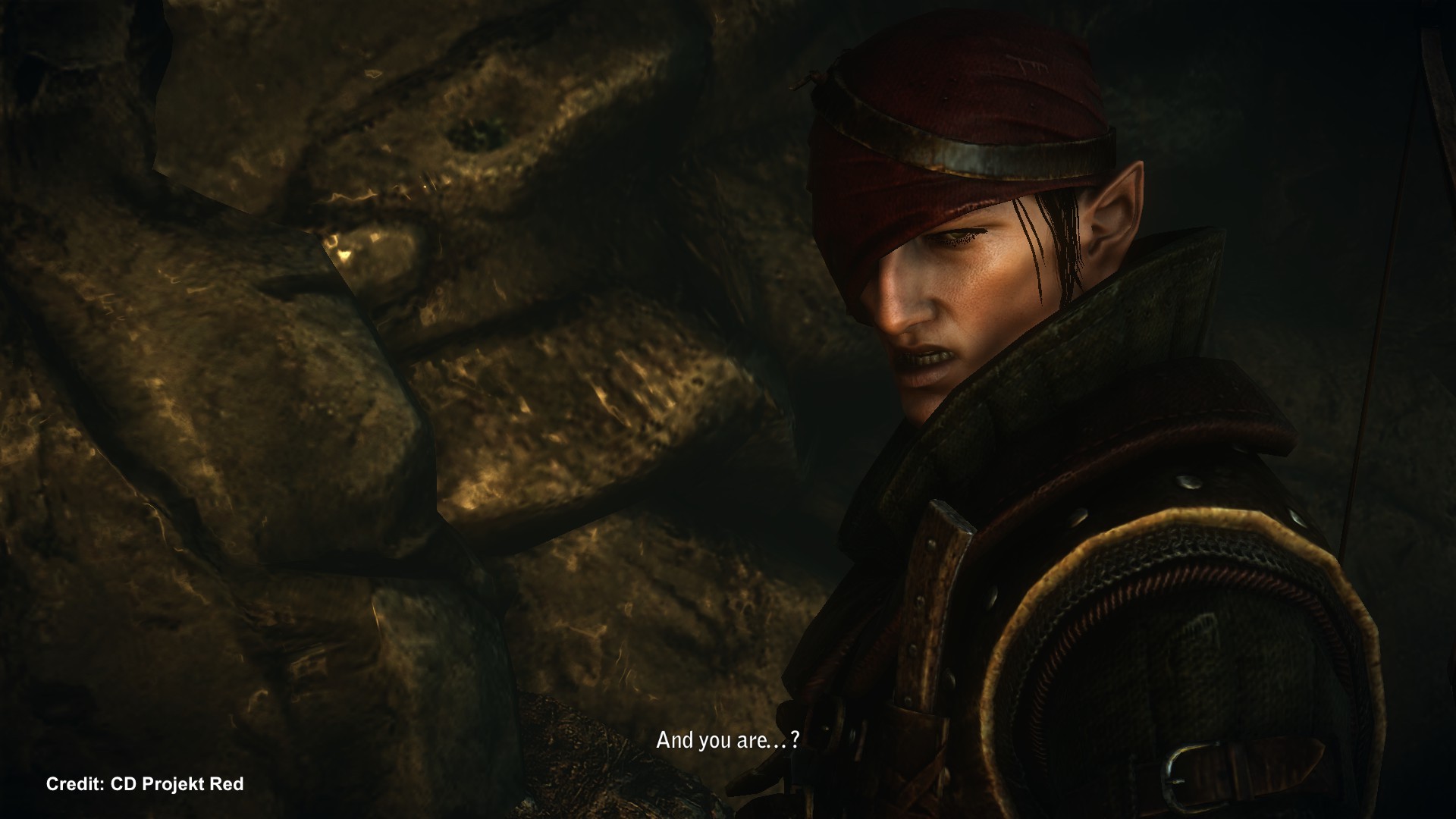
In Act II we can probe his feelings around the subject a little and come to understand that his aims stem primarily from a depressing kind of pragmatism. He’ll speak about the futility of elves’ attempts to procreate quickly enough to outweigh young elven fighters’ deaths. He doesn’t believe his side can repel Henselt’s army, and that death is probably on the horizon. He says to Geralt that, “You, the dh'oine, will conquer this world with your thoughtless expansion. We are dying out.”
And, if you sided with the Scoia’tael in TW1 and imported your save into TW2, you can probe further: “Yaevinn. I knew him,” he says of the first game’s idealistic Scoia’tael leader. “He had beautiful dreams and desperately wanted me to share them. Asked the same of you, I heard.” When Geralt says he found Yaevinn’s reasons – fighting violently for nonhumans’ future – just, Iorveth replies, “Because they are. But they're equally unrealistic. Yaevinn saw combat and killing as poetry. Whereas war is prose, with no place for beauty.”
Cognitive dissonance is certainly a thing. It’s perfectly credible that Iorveth could – and probably does – hold these two wildly different desires at the same time, even as they pull in opposite directions. But we never get to hear from him how he thinks this will work in practice; how he reconciles these views in anything like a tangible sense. Given he considers himself “only a warrior”, perhaps he agrees with the thrust of the goal while intending to leave the finer details and niceties to others, such as his leader Saskia. But it still leaves us grappling with a character who is, in his dearest desires and deepest motives, a tangle of contradiction.
We are asked to join Iorveth, to sign up willingly to fight and kill alongside him in the name of his cause, all while knowing that there are fundamental complications and inconsistencies running through his ideologies like a seam through stone. It could be enough to undermine them completely – and, perhaps, for some players it might. But I find that it’s so deeply relatable and (I fear to use the word, but…) human that it makes him all the richer as a character.
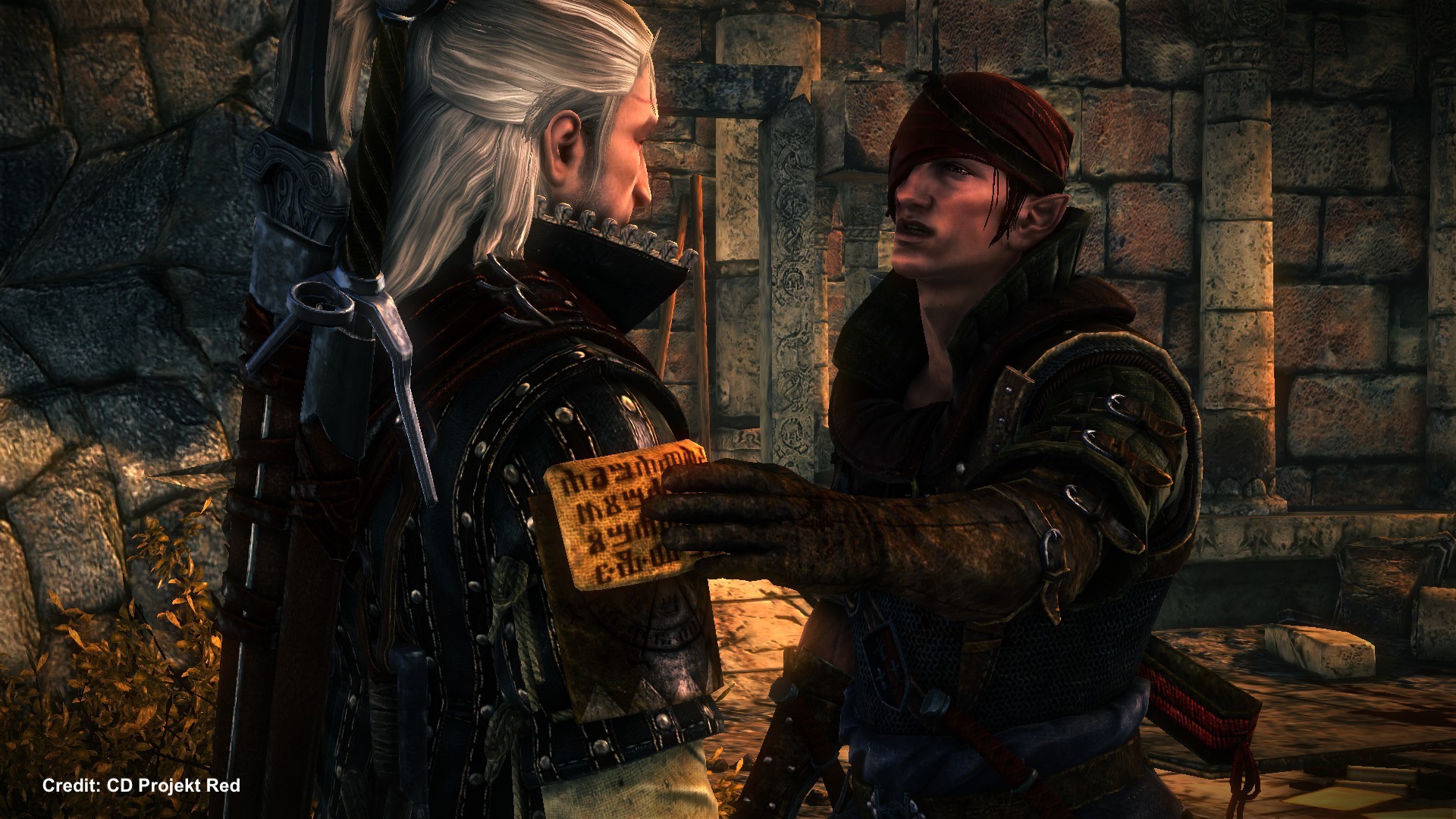
The mystery and unknowableness that lives in the heart of Iorveth’s beliefs and behaviours doesn’t make him wrong, or duplicitous, or even woefully misguided. It makes him complicated. We begin to see that he’s been pushed into having to “be who he needs to be” because of the relentless, merciless nature of a world that seeks to snuff out his kind – and is winning. Fast.
He hasn’t found a way to neatly reconcile these difficult realities because he’s a living person trying to fight on and work this stuff out as he goes, all while bearing the enormous burden of leading young Aen Seidhe into constant conflict, who must succeed if they are to justify the lives lost – ones that might have otherwise spent their time creating more life and adding to the dwindling elven numbers before the Aen Seidhe are lost to history.
We can’t ever peek into Iorveth’s mind and find out how he truly feels in wrestling with these things. He never lets us see the raw awfulness of it beyond the calm statements he makes and questions he answers about his current aims. What needs to be done, now, and why. And so we must try to infer and imagine these things – to tease out and decide for ourselves what we believe Iorveth thinks and feels, deep down, about the impossible situation he has spent his long life dedicated to wrangling.
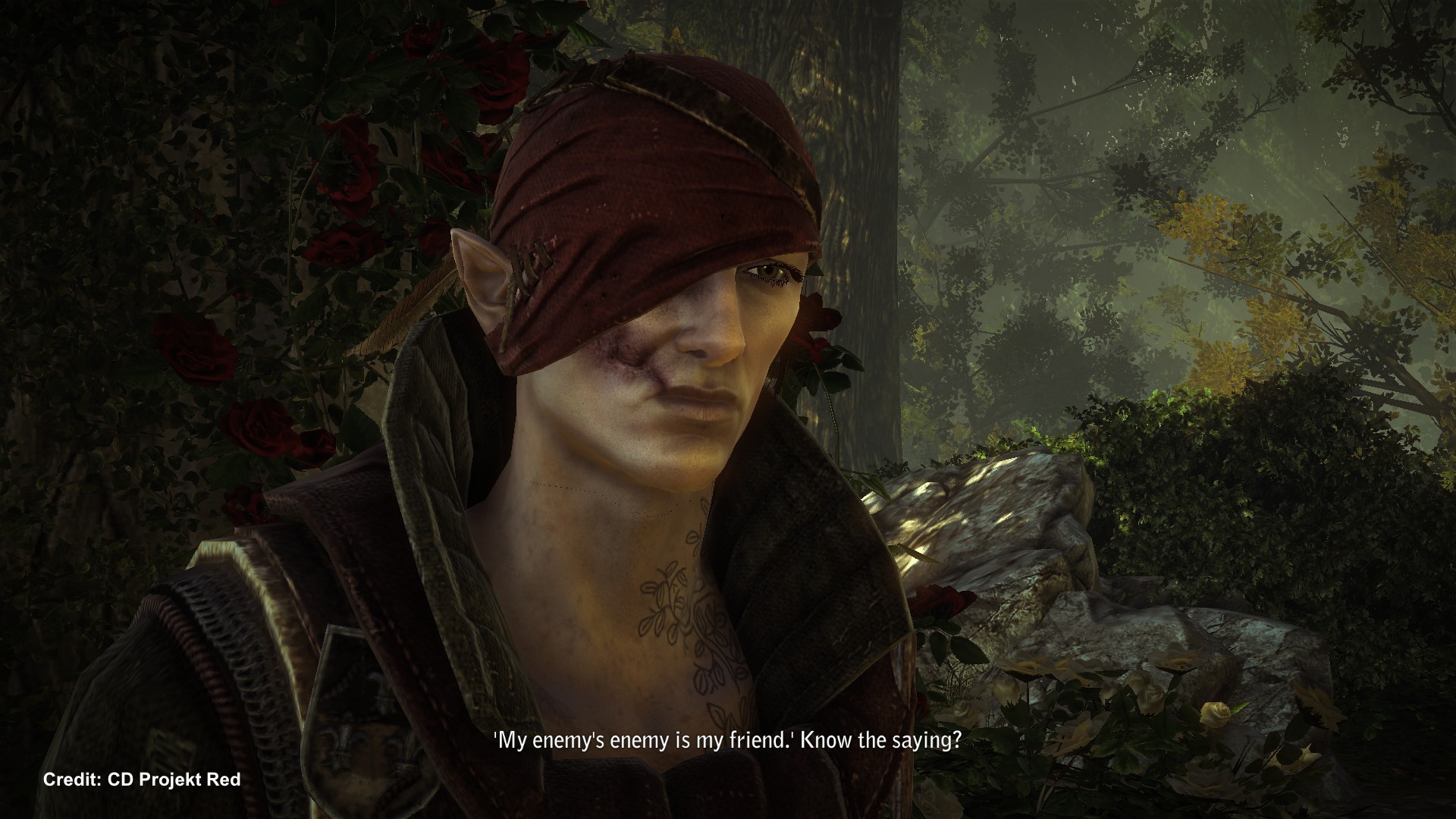
Conclusions: Where The Mystery Leaves Us
The effect of spending almost an entire game at the side of someone who can become a true friend and ally, but is also cloaked in sheer, unapologetic mystery is powerful. Like Astarion's eye-colour tease, it kicks the player’s imagination into gear. Iorveth almost never offers pieces of him deeper self to us, and we don’t get to ask for them – or get almost any of the answers we seek. The result is that, if he won’t tell us, we have to fill those gaps ourselves. We have to become co-writers of his story.
Iorveth is a brilliant example of game writing and visual design fusing to enrich an RPG because he invites us to roleplay within an additional dimension: who is my Iorveth in my Geralt’s adventure? With the studio pointedly sowing a few seeds to inspire our ideas, we get to decide these fundamentals of a character’s formative experiences ourselves.
Maybe I can buy into that relic peddler's guff about Iorveth. Maybe the great and famous elven warrior really did get into a scrape in the forest and take a spear to the face so badly the shaft cracked. Maybe it was 'just' a faceless foot-soldier who did it, and not some grand, heroic rival. That version of Iorveth would allow for a powerful sense of shared understanding between him and the character we inhabit, given game-Geralt also suffered a similar fate: the equally great and famous witcher was once killed by a stab in the gut from an unknown farmer's pitchfork – a major plot beat that is woven into The Witcher 2's core story itself.
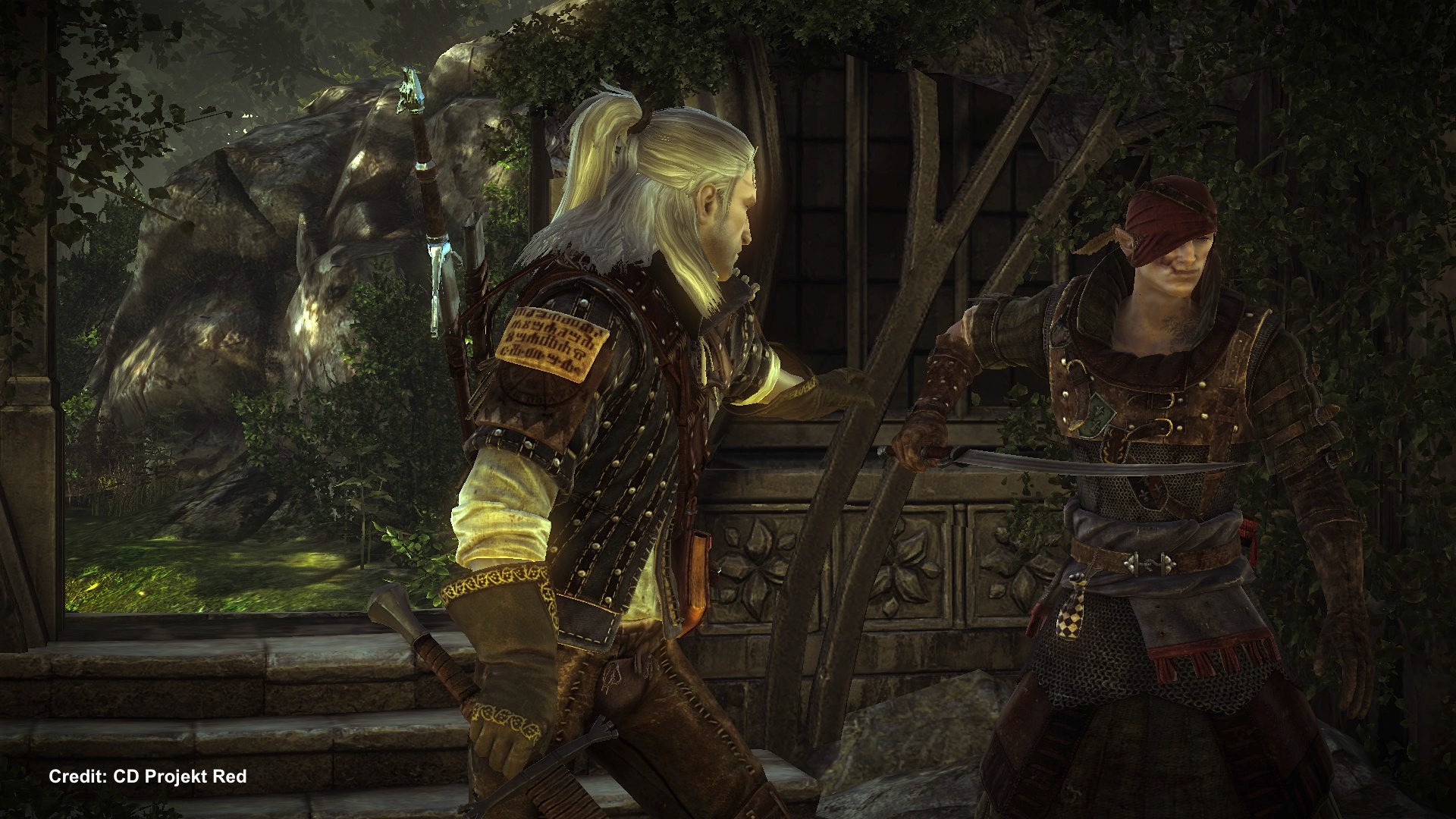
Or maybe we can discount the peddler's tale entirely and decide another origin story for the infamous Scoia'tael leader. Maybe he got that scar fighting a Special Forces commander like Roche – the owner of one of those trophy-badges that line his armour – which would help fuel the fire of their enduring feud in the game?
Who knows what filled the century or more that preceded the too-brief slice of time that we got to spend with the sly old elf? Through dialogue and other storytelling we get snatches of Iorveth’s past that have clearly shaped his present self. They point to his experiences of violent conflict: he was once an officer in the nonhuman Vrihedd Brigade during the Battle of Brenna. He somehow escaped the executions that wiped out his fellow elven officers (though – again – we never find out how). We know from his badge collection that he’s successfully felled multiple special forces leaders in the past and is determined to add Vernon Roche, head of Temeria's own unit, the Blue Stripes, to his tally. These pieces of the puzzle help to contextualise Iorveth’s tireless drive to beat back the dh’oine enemies who are merciless in their efforts to eradicate the Aen Seidhe – but they don’t tell the whole story.
Whatever we decide to take as gospel from the snatches we hear and see in the game, we go from passive (being told a story) to active (writing it with the developers), and that’s fantastic.
Frothy-mouthed players (like me) find ourselves tempted into exhausting every dialogue tree; into searching Iorveth’s secret hideout for clues about who he is; into asking every other NPC to cough up what they know about him; into hammering every variation of ‘how did Iorveth get his scar’ into Google Search. When we find we can barely scratch the surface, we then eagerly step into the role of co-writer; we imagine for ourselves the missing pieces of the puzzle that allow us to forge a deeper, richer sense of the whole.
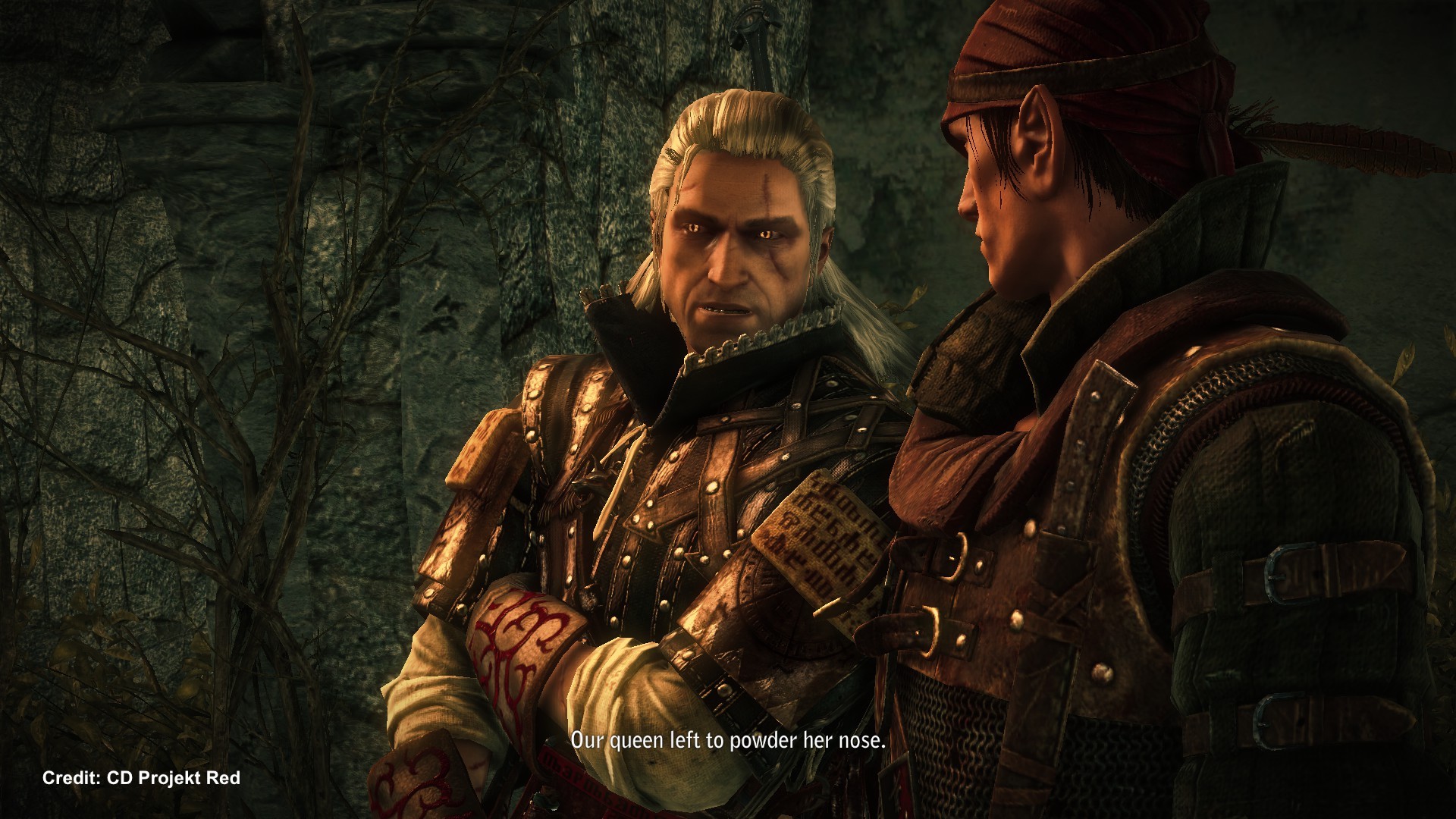
To help us fill these gaps we begin to lean harder into who Iorveth is in the present, hanging onto every word he utters to flesh out as full a picture of him as we can get, based pretty much only on our experience of him throughout this one meagre slice of his long elven life. Those trophies of fallen nonhuman-slaughtering commanders he proudly wears; his hodge-podge mix of dh’oine and elven gear; his depressingly pragmatic views about the future of his kin – they all now offer us vivid colours that we can use to paint the precise strokes of who we think he is, and has been.
The fact that I’m writing this blog post, still voraciously dwelling on who this compelling character really is 13 years after the game’s launch, and filling those spaces with my own ideas, speaks to how powerful wrapping RPG NPCs in a little expertly judged mystery can be. Because I always come away from The Witcher 2 wanting much, much more.